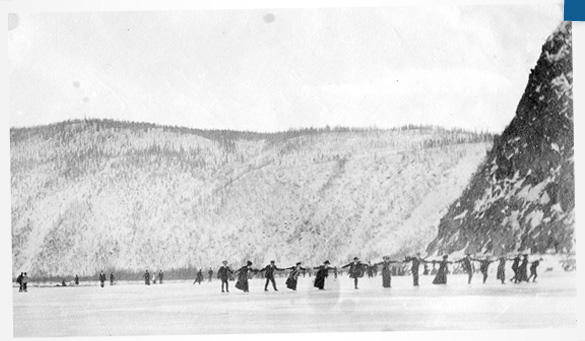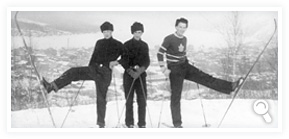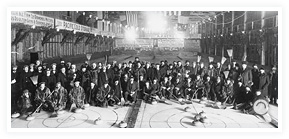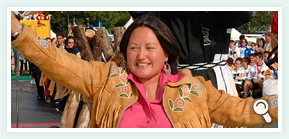
People skating at the mouth of the Klondike River, Dawson City, ca. 1900.
Yukon Archives, James Fyfe fonds, 86/42 #44

In the Yukon, for a good portion of the year outdoor recreation means winter recreation. Skating, tobogganing, sledding, skiing, dog-sledding and snowshoeing have all been popular since the territory’s early days, first as hobbies and activities and later as organised sports.
Yukoners have always been adept at making the most of their leisure time. Dawson had an Amateur Athletic Association and a hockey league by 1902. The Northwest Mounted Police had a rink in their compound at Whitehorse by the early 1900s. Over the years, winter sports and competitions have improved people’s athletic skills, fostered friendships and helped build communities.

Bella Bruce and Josephine Netro, Old Crow, ca. 1965. Oblate priest Father Mouchet developed a cross-country ski program for young people in Old Crow in the 1960s.
Yukon Archives, Father Jean-Marie Mouchet fonds, 91/51 #110

Harry Coell, Les Millen and Roy Butterworth on the Dome at Dawson City, ca. 1935–42.
Yukon Archives, Roy Butterworth fonds, #9503

Four figure skaters “shoot the duck“, Whitehorse, ca. 1970.
Yukon Archives, Whitehorse Star Ltd. fonds, 82/563, f. 133 #17

The scoreboard at the first Canada Winter Games, held in Quebec City in 1967.
Yukon Archives, Whitehorse Star Ltd. fonds, 82/563, f. 7 #7

Kathleen, George, Lucy (Linch) and Theodore Van Bibber, 1937.
Yukon Archives, Van Bibber family fonds, 79/2 #162
Canada Winter Games
The Canada Winter Games provide a showcase for Canadian athletes and further the advancement of sport throughout Canada. The games give athletes the chance to develop their skills and take part in new social and cultural experiences.
(Right) Performer Sharon Shorty at the closing ceremonies of the Regina Summer Games, August 2005, where the torch was passed to the 2007 Canada Winter Games.
Yukon Government photo





